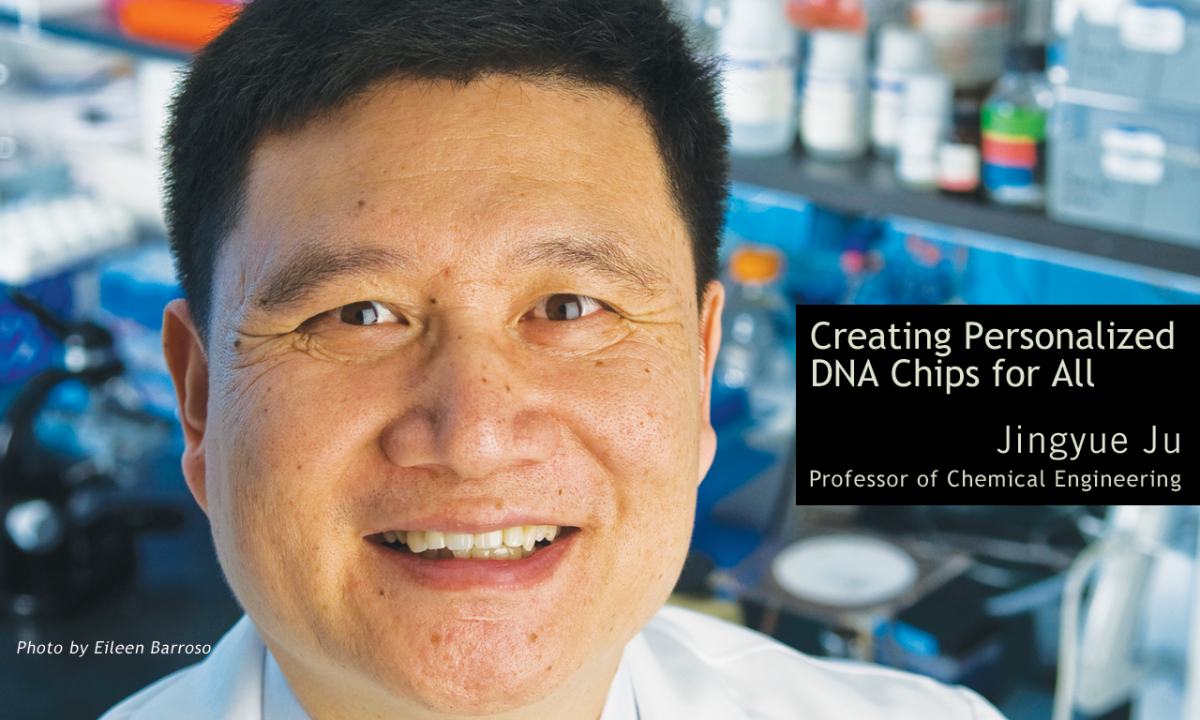Chemical Engineering
801 S. W. Mudd, MC 4721
Phone: 212-854-4453
cheme.columbia.edu
Chemical engineering is a highly interdisciplinary field concerned with materials and processes at the heart of a broad range of technologies. Practicing chemical engineers are in charge of the development and production of diverse products in traditional chemical industries as well as many emerging new technologies. The chemical engineer guides the passage of the product from the laboratory to the marketplace, from ideas and prototypes to functioning articles and processes, from theory to reality. This requires a remarkable depth and breadth of understanding of physical and chemical aspects of materials and their production.
 The expertise of chemical engineers is essential to production, marketing, and application in such areas as pharmaceuticals, high-performance materials in the aerospace and automotive industries, biotechnologies, semiconductors in the electronics industry, paints and plastics, petroleum refining, synthetic fibers, artificial organs, biocompatible implants and prosthetics and numerous others. Increasingly, chemical engineers are involved in new technologies employing highly novel materials whose unusual response at the molecular level endows them with unique properties. Examples include environmental technologies, emerging biotechnologies of major medical importance employing DNA- or protein-based chemical sensors, controlled-release drugs, new agricultural products, nanoparticle-based materials, bio-nanoparticle conjugates and many others.
The expertise of chemical engineers is essential to production, marketing, and application in such areas as pharmaceuticals, high-performance materials in the aerospace and automotive industries, biotechnologies, semiconductors in the electronics industry, paints and plastics, petroleum refining, synthetic fibers, artificial organs, biocompatible implants and prosthetics and numerous others. Increasingly, chemical engineers are involved in new technologies employing highly novel materials whose unusual response at the molecular level endows them with unique properties. Examples include environmental technologies, emerging biotechnologies of major medical importance employing DNA- or protein-based chemical sensors, controlled-release drugs, new agricultural products, nanoparticle-based materials, bio-nanoparticle conjugates and many others.
Driven by this diversity of applications, chemical engineering is perhaps the broadest of all engineering disciplines: chemistry, physics, mathematics, biology, and computing are all deeply involved. The research of the faculty of Columbia’s Chemical Engineering Department is correspondingly broad. Some of the areas under active investigation are: protein engineering, fundamentals and engineering of polymers, biopolymers, and other soft materials, colloidal machines, atmospheric chemistry and air quality, fundamentals and applications of electrochemistry for energy storage and manufacturing, multiphase flows, carbon capture and utilization, catalysis, and electrocatalysis, solar fuels, the bioengineering of artificial organs, the engineering and biochemistry of sequencing the human genome, emergent phenomena in complex and dynamical systems, the biophysics of cellular processes in living organisms, and DNA-guided assembly of inorganic and biological nanoscale objects.
Many experimental approaches are employed, from magnetic resonance imaging to synchrotron techniques, and the theoretical work involves analytical mathematical physics, numerical simulations, and data science.
Interested students will have the opportunity to conduct research in these and other areas. The Department of Chemical Engineering at Columbia is committed to a leadership role in research and education in frontier areas of research and technology where progress derives from the conjunction of many different traditional research disciplines. Increasingly, new technologies and fundamental research questions demand this type of interdisciplinary approach.
The undergraduate program provides a chemical engineering degree that is a passport to many careers in directly related industries as diverse as biochemical engineering, environmental management, and pharmaceuticals. The degree is also used by many students as a springboard from which to launch careers in medicine, law, consulting, management, banking and finance, politics, and so on. For those interested in the fundamentals, a career of research and teaching is a natural continuation of their undergraduate studies. Whichever path the student may choose after graduation, the program offers a deep understanding of the physical and chemical nature of things and provides an insight into an exploding variety of new technologies that are rapidly reshaping the society we live in.
Facilities for Teaching and Research
The Department of Chemical Engineering provides access to state- of-the-art research instrumentation and computational facilities for its undergraduate and graduate students, postdoctoral associates, and faculty. The recently renovated chemical engineering undergraduate laboratory features equipment including a Waters HPLC system, a SpectraMax spectrophotometer, a rotating disk electrode and potentiostat, a fixed bed adsorption unit, a solar cell/electrolyzer/ fuel cell apparatus, flow and temperature control equipment, an IR camera, two PhyMetrix Bench-top Moisture Analyzer units, and 15 computer work stations.
State-of-the-art specialized research equipment are housed within individual faculty laboratories. Shared research laboratory facilities exist in the Columbia Electrochemical Energy Center, the Soft Materials laboratory, and the Columbia Genome Center.
Chemical engineering students, faculty, and research staff also have access to shared NMR, MRI, photochemical, spectroscopic, and mass spectrometry facilities in the Department of Chemistry.